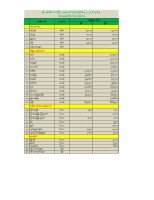Japan's trade deficit in May shrank 42.0 percent from a year earlier to 1.37 trillion yen, due largely to a decline in fuel import costs, with slowing export growth casting a pall over the economy, government data showed Thursday.
Imports stood at 8.67 trillion yen, down 9.9 percent, while exports grew 0.6 percent to 7.29 trillion yen, a record for May, amid a weak yen.
Japan remained in the red for the 22nd straight month, highlighting the resource-scarce nation's reliance on imports.
U.S. bound shipments of cars and machinery supported Japan's total exports, even as those of equipment and electronic components required to manufacture semiconductors declined, according to the Finance Ministry's preliminary data.
Crude oil, coal and liquefied natural gas imports fell, a year after their sharp increases in value terms helped widen the country's trade deficit amid supply concerns triggered by Russia's war in Ukraine.
Aggressive monetary tightening in the United States and Europe has raised concern about a global economic slowdown. The U.S. dollar was 4.8 percent higher against the yen than in May 2022, reflecting the diverging monetary policy paths of the Federal Reserve and the Bank of Japan.
"The easing of supply bottlenecks has helped boost car exports, but it's clear that overall export growth is losing steam," said Yuichi Kodama, chief economist at the Meiji Yasuda Research Institute.
"Initial expectations were that weakness in the United States and pent-up demand in China (after the end of its 'zero-COVID' policy) would cancel each other out. In reality, China's recovery has been far slower than expected," Kodama said.
Japan had a trade surplus of 434.89 billion yen with the United States as exports grew 9.4 percent to 1.37 trillion yen and imports rose 1.5 percent to 938.89 billion yen.
With major trading partner China, Japan ran a trade deficit of 540.55 billion yen, remaining in the red for the 26th straight month, as imports fell 5.9 percent to 1.88 trillion yen and exports dropped 3.4 percent to 1.34 trillion yen.
Japan ran a 105.16 billion yen trade deficit with the rest of Asia including China, falling into the red for the first time in four months. A 141.03 billion yen deficit was reported with the European Union.
Japan's economy grew for the second straight quarter in January to March, despite the drag from weak exports.
Economists expect modest growth to continue in the current quarter to June, helped by relatively resilient consumption and capital spending despite uncertainty over the strength of the U.S. and Chinese economies.
Source : The Japan Today (16-6-2023)
(Economic Counsellor, Tokyo)


